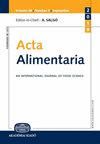Rice flour coating supplemented with rosemary essential oil to preserve the internal, microbiological, and sensory quality of quail eggs
IF 1
4区 农林科学
Q4 FOOD SCIENCE & TECHNOLOGY
引用次数: 4
Abstract
Coatings of rice flour (RF), reinforced or not with rosemary essential oil (ROS), were used to evaluate changes in the internal quality of quail eggs stored at room temperature. Quality parameters [egg weight loss (EWL, %), Haugh unit (HU), yolk index (YI), albumen and yolk pH], microbiological (counts of total aerobic mesophilic bacteria and Enterobacteriaceae) and sensory (colour, aroma, odour, texture, taste, and general acceptability) parameters were evaluated during the experiment. Compared to the number of total aerobic mesophilic bacteria on the shell of uncoated eggs (2.02 ± 0.49; 1.78 ± 0.20 log10 CFU mL−1), RF/ROS exhibited significant inhibition effects for these bacteria on 0. (1.16 ± 0.25 log10 CFU mL−1) and 21. (0.84 ± 0.11 log10 CFU mL−1) days of storage at room temperature. On days 7, 14, and 21, RF had no effect on HU (P > 0.05), but eggs coated with RF/ROS had significantly higher HU (P < 0.05) than uncoated eggs from day 14, maintaining grade AA (73.88 ± 2.67) on day 21, while uncoated eggs had grade A (68.90 ± 1.55) at that time. The RF coating reinforced with ROS was a bioactive, efficient, and safe formulation for application based on internal quality, microbiological and sensorial aspects of quail eggs.添加迷迭香精油的米粉涂层,可保持鹌鹑蛋的内部、微生物和感官品质
用米粉(RF)涂层,无论是否用迷迭香精油(ROS)增强,来评估室温下储存的鹌鹑蛋内部质量的变化。在实验过程中评估了质量参数[鸡蛋重量损失(EWL,%)、Haugh单位(HU)、蛋黄指数(YI)、蛋白和蛋黄pH]、微生物(总需氧中温细菌和肠杆菌科细菌的计数)和感官(颜色、香气、气味、质地、味道和一般可接受性)参数。与未包衣鸡蛋外壳上的总需氧中温细菌数量相比(2.02±0.49;1.78±0.20 log10 CFU mL−1)、RF/ROS对0。(1.16±0.25 log10 CFU mL−1)和21。(0.84±0.11 log10 CFU mL−1)在室温下储存的天数。在第7、14和21天,RF对HU没有影响(P>0.05),但从第14天起,涂有RF/ROS的鸡蛋的HU显著高于未涂鸡蛋(P<0.05),在第21天保持AA级(73.88±2.67),而未涂鸡蛋当时的HU为A级(68.90±1.55)。基于鹌鹑蛋的内在质量、微生物和感官方面,ROS增强的RF涂层是一种具有生物活性、高效和安全的应用配方。
本文章由计算机程序翻译,如有差异,请以英文原文为准。
求助全文
约1分钟内获得全文
求助全文
来源期刊

Acta Alimentaria
农林科学-食品科技
CiteScore
1.80
自引率
0.00%
发文量
47
审稿时长
18-36 weeks
期刊介绍:
Acta Alimentaria publishes original papers and reviews on food science (physics, physical chemistry, chemistry, analysis, biology, microbiology, enzymology, engineering, instrumentation, automation and economics of foods, food production and food technology, food quality, post-harvest treatments, food safety and nutrition).
 求助内容:
求助内容: 应助结果提醒方式:
应助结果提醒方式:


